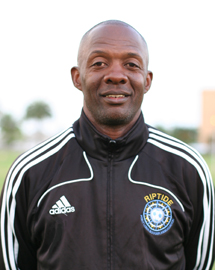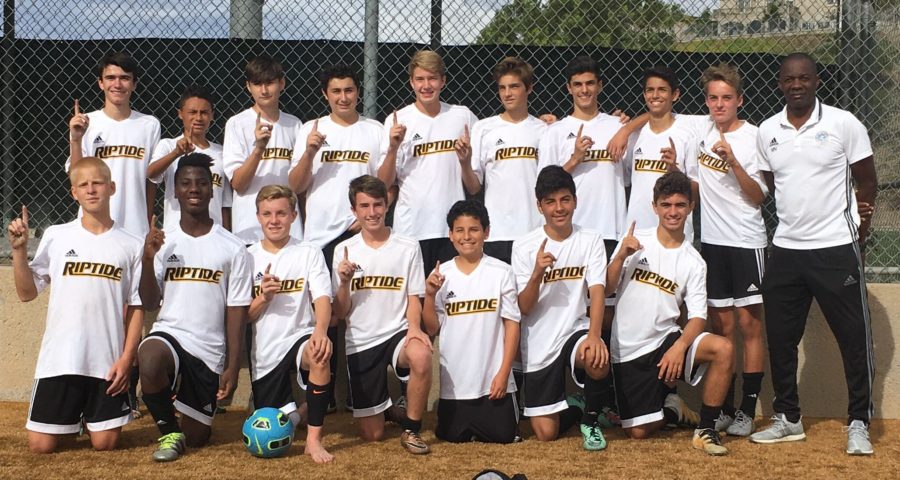Based in the beautiful Point Loma community in San Diego, California, Riptide Soccer Club is the competitive arm of the Point Loma Soccer Association.
Based in the beautiful Point Loma community in San Diego, California, Riptide Soccer Club is the competitive arm of the Point Loma Soccer Association. Originally founded in 2010, Riptide SC is a club that has continued to grow and is an excellent place for young players looking to hone their craft and grow in the game of soccer.
SoccerNation’s Dike Anyiwo recently caught up with Riptide Director of Coaching Michael Ndoumbe to learn more about the club he oversees and the background on which he has based his coaching philosophy. Now in his 5th year, having initially begun as a Technical Director, Ndoumbe has overseen the implementation of a coaching curriculum and methodology that has seen Riptide SC blossom and flourish.
Ndoumbe’s experience in soccer is as well-rounded as it is elite. A retired professional player, Ndoumbe played for the Cameroonian National Team for nearly a decade before emigrating to the United States where he played with the Los Angeles Salsa and the old San Diego Flash before ultimately transitioning into coaching.
Michael Ndoumbe holds a USSF “A” License, a USSF National Youth License as well as NSCAA Goalkeeping Licenses for Levels I and II.

Dike Anyiwo: Tell me about the history of your club and how you came into your current role.
Michael Ndoumbe: Riptide was founded as a recreational program back in 2009, and while there was a large base of players, there was no coaching education program at the time. The majority of our coaching staff had the basic United States Soccer Federation E License. My goal was obviously to change that when I came in as the Technical Director. For any club to have good players, they must first have good coaches. If you have good coaches with a lot of knowledge, then there is better training. Ultimately, with better training you produce better players. It’s a chain reaction.
So when I came in, I said we’re going to stress coaching education. I’m an instructor for the Federation teaching E, D, C and B Licenses so I have a very good feel for what you should expect and I’ll help you to prepare.
I told them that the minimum level to come in as a new coach would be a D License. For those already here, we encouraged them to climb the ladder.
I stressed the National Youth License Course because its geared towards specific younger age groups, U6/U8/U10.
We began holding monthly coaching clinics. The last Monday of the month starting after tryouts we do a clinic in which I give a topic to one of our coaches that are age-specific to the team he or she is coaching now. They have to write up a lesson plan and distribute notes to the other coaches beforehand. We all watch and take notes as the coach runs a session, and afterward we all go and dissect the session, and give feedback to the coach.
This is an excellent exercise because now we have coaches who are planning sessions ahead of time, who are receptive to feedback and who can learn from their peers and also instruct their peers.
The coaches like the clinics. It helps them gain knowledge and improve themselves.
I always stress on coaching education because it helps the coaches become better individuals. Well educated coaches can now relay better info to players and parents. It’s all about educating players to become better soccer players. Educating parents is important because they need to understand what it takes to get to whatever desired level the players have.
Dike Anyiwo: What sorts of challenges do you face? Where have you seen growth during your time at Riptide?
Michael Ndoumbe: Finding a good board has been difficult, but over the last three years we’ve found a really good group who work well together. They each have their individual strengths be it fundraising or event planning, marketing or finances, but overall we are building a solid structure that, if everyone left tomorrow, the club would continue to grow and develop.
We now have our own tournament coming into it’s third year, the Riptide Summer Classic, that brings in 120-130 teams which is not bad for a very young club.
We exist in a competitive environment and we are small club. We’re based Point Loma and there are a number of good competitive clubs nearby. I believe that because we are a strong community-based club, we gain more than we lose when it comes to player recruitment.
Some clubs like to have 3-4 teams per age group, but once you get beyond that first team, the quality of the coaches drops off significantly. Yes we lose our top players, but we pick up quite a few from those other “lower” teams where parents are learning that in being on some of those teams with very inexperienced coaches who don’t show up to games or can’t properly prepare their sessions, they are really just subsidizing those higher ‘elite’ teams.
The biggest challenge is in educating the parents. Oftentimes parents are blindsided and lured away by marketing or “name brand” clubs. I always ask parents to look at the details before moving on. Compare the coaches at Club A vs Club B:
If you move to Club B because they have a big name, but you’re on the second or third team there, vs. being on the top team at Club A, which is a smaller or newer club, is that the right situation for you?
Our goal at Riptide is to help players grow as individuals. Both as soccer players but also as human beings. Over time you can see who is more dedicated, who is playing for the social aspect and who is looking to play in college and we try to help those players. We’re helping our players to reach their goals and help market our own players to colleges be it in showcases or recommendations based on relationships we have.
If we can help you join the top team at a big club then hey, we can’t argue with that.
Our rec program used to be combined with the YMCA, which didn’t really work for us. We separated ourselves from YMCA and kicked off our own rec program that is up to about 150 kids in Spring and 300 in the Fall.
We train in Liberty Station which has a nice field, but there are a number of other organizations who also use the fields and it can be a challenge when it comes to upkeep. Also, because it is city property, we sometimes don’t have control over watering which is a challenge. We play our home matches at Cleator Park mostly, with the occasional match at Liberty Station. We’re up to 18 competitive teams and it feels like we’re getting there. Our competitive clubs play in the Presidio League or the SDDA (San Diego Development Academy).
Dike Anyiwo: You’ve used the word “education” several times already. What do you make of the various learning opportunities coaches have today? Is there one path that is best for coaching development?
Michael Ndoumbe: US Soccer is the official pathway for coaching education, and is officially recognized by FIFA. In these days, there are so many ways to learn more through U.S. Soccer, the NSCAA, online, books, DVDs etc.
The more you seek knowledge the better, but more and more the Federation will make certain things mandatory. In the past they were more reluctant to impose standards. For example, in the past you could coach in college without a license.
Now, at the Academy Level, in order to be a Director you need to have an A License and attend the Academy Director’s Course which is a year-long training program. For any other Academy coach, you need to have a B License. That minimum requirement might trickle down to regular youth clubs as well going forward where they may mandate every coach have a specific license or module coaching at a specific level.
The NSCAA is wonderful and they have so much information. Their certificates are not recognized by FIFA though so if you were to go to another country, while you may have the knowledge, you don’t have a credential that is recognized.
Dike Anyiwo: You mentioned that you are a USSF Coaching Instructor, where else are you active in soccer?
Michael Ndoumbe: I’m also involved in scouting for the Federation. Depending on my availability, I’ll go watch Academy teams to try to find players for the Youth National Teams. I’m also a Professional Match Evaluator which is neutral observer for the MLS. I watch and observe anything that happens on or off the field before, during and after a match, be it referees, coaches or players. Afterwards I fill out a report online and give my personal opinion on the referees and anything that relates to the game. I’m assigned specific games and there’s a protocol, a checklist if you will that I go through.
I’m still involved in the Olympic Development Program at the regional level as well. With the USSDA coming in, ODP isn’t the primary outlet for identifying National Team Players, but the OPD program is still active.
Dike Anyiwo: What have you learned in your time with Riptide? How do you define your success?
Michael Ndoumbe: I’ve learned so much from being involved in coaching education. I believe it has made me a better coach and human being. Dealing on a daily basis with coaches, parents and training or coaching players with different skill levels and ages has made me grow as an individual.
If we can help a player get to the level where they need to move on to join an Academy level team then we’re happy. It means we’ve done our job well.
We’re heading in the right direction. We’re growing. We’re trying to create a bridge between our rec and competitive programs. The cross pollination of coaches from the rec to the competitive program is working well.
